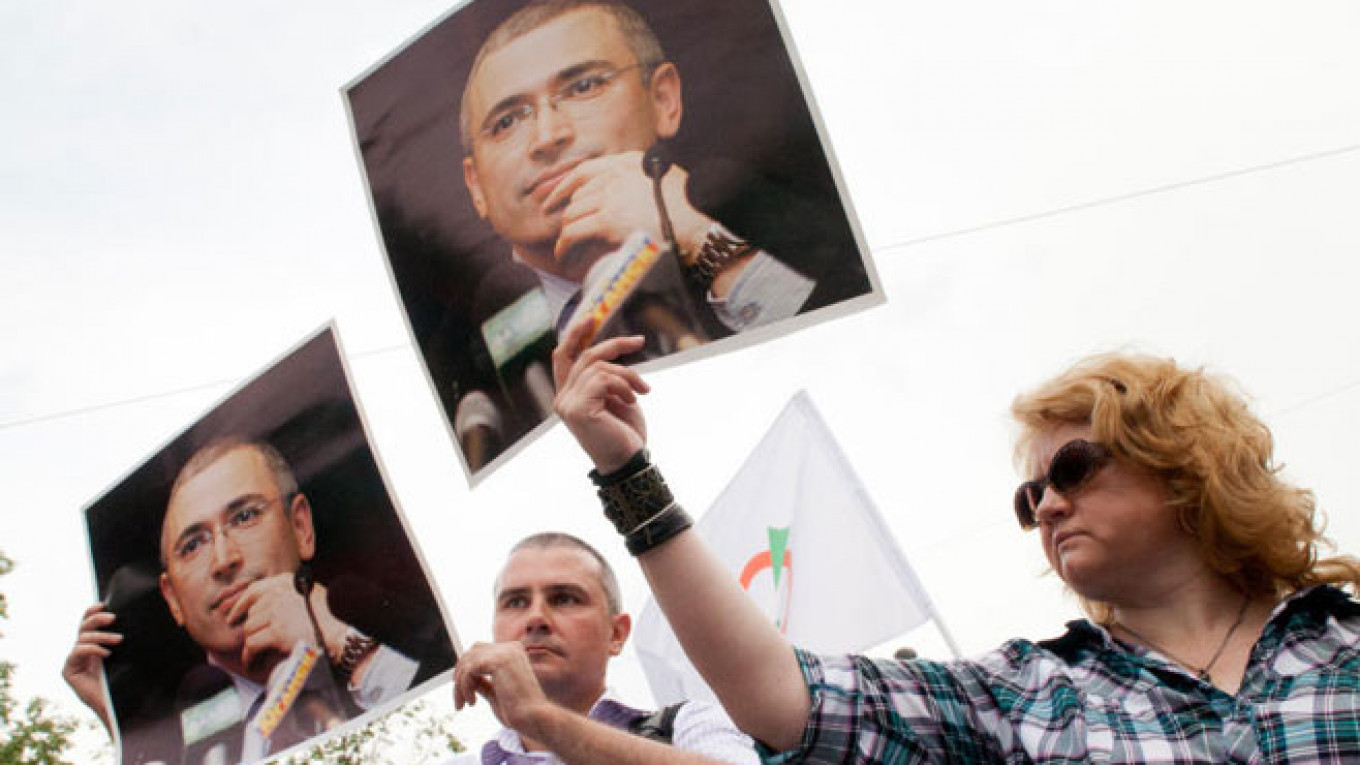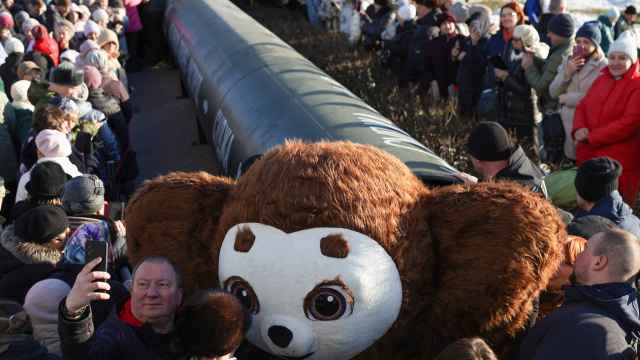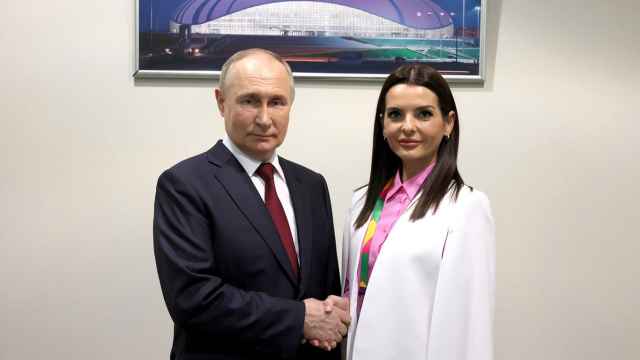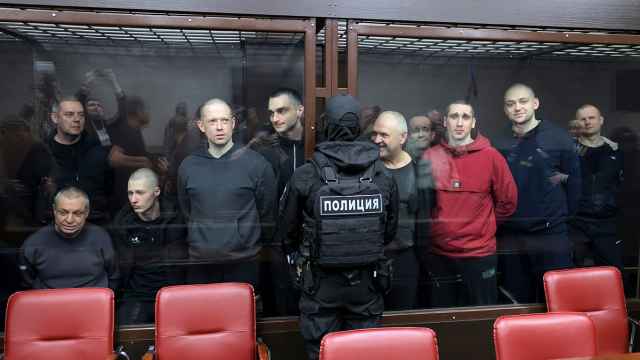At the moment, Russia's fragmented opposition movement doesn't stand a chance against the ruling authorities, but with the passage of time and his sights set on the long term, former oil tycoon Mikhail Khodorkovsky may well succeed in realizing his political ambition, politicians and analysts told The Moscow Times on Monday.
Khodorkovsky, who was freed in December after more than a decade behind bars on tax evasion and fraud charges that were viewed widely as having been politically motivated, announced plans to re-launch his political foundation Open Russia over the weekend.
Open Russia will act as a horizontal platform for pro-European political forces in Russia, striving to unite the scattered political and civic opposition movements, the former oil baron said.
Speaking with Le Monde in an interview published Sunday, Khodorkovsky added that he is prepared to spearhead European-style development in Russia, even noting a willingness to pursue the presidency "in case it appears necessary to overcome the crisis and carry out constitutional reform."
Khodorkovsky's comeback appears to have been motivated by a desire to create a true political dialogue in Russia, where constituents have grown increasingly apathetic in recent years.
A recent survey conducted by independent pollster the Levada Center revealed that only 7 precent of Russians would participate in political protests given the opportunity, while 53 percent of respondents said they do not follow politics at all. The studies were conducted in late August among 1,600 respondents with the margin of error not exceeding 3.4 percent.
Speaking with The Moscow Times about Khodorkovsky's revitalized political fervor, representatives of Russia's opposition movement demonstrated a clear lack of ideological unity. It is this discord precisely that many analysts have blamed for the failure of the opposition to present a viable alternative to the Russian government's current structure.
Switzerland: 'A Far Cry From the Kremlin'
Sergei Mitrokhin, leader of the liberal Yabloko party, referred to Khodorkovsky's plan for Open Russia as "destructive."
"I think this is a counter-productive project that will only serve to further dissipate the opposition movement. Political forces must organize in the form of parties, not foundations," Mitrokhin said.
Mitrokhin further took issue with the fact that Khodorkovsky is currently based in Switzerland, not Russia.
"The only thing you can organize from Switzerland is what was organized by Vladimir Lenin in 1917," he said. As a young revolutionary, Lenin was exiled to Zurich. He returned to Russia in a sealed one-carriage train to organize the October Revolution, which brought the Bolsheviks to power.
After Khodorkovsky was pardoned by President Vladimir Putin and released from prison in December, he moved to Germany and then Switzerland, where he obtained a residence permit in May. Khodorkovsky has not indicated any plans to return to Russia. When he declined to attend his mother's funeral in August, he cited fears that if he were to re-enter the country, he may be deprived of the right to leave it again. Khodorkovsky is barred from running for public office because of his criminal record.
Force to Be Reckoned With
Longtime opposition politician Vladimir Ryzhkov voiced optimism with regard to Open Russia, which he views as a political force to be reckoned with.
"We saw just how serious the government is about him when Open Russia activists were attacked this Saturday," Ryzhkov, a former State Duma deputy and co-chair of liberal democratic party RPR-PARNAS party, told The Moscow Times.
During an online conference welcoming Open Russia's re-launch Saturday, several unidentified men appeared to stage an attack the foundation's premises in Nizhny Novgorod, as the cameras continued rolling.
Hard Time and Credibility
Former liberal lawmaker Gennady Gudkov told The Moscow Times in a phone interview that Khodorkovsky's years in prison lend him a certain credibility among Russian politicians.
"I think the Khodorkovsky factor will grow year after year, so this is a long-term process," Gudkov said.
"I like it that he talks about a fundamental constitutional reform. That is what we truly need." He added, "Whoever says otherwise is a charlatan."
Khodorkovsky has repeatedly advocated for a better balance of power in Russia, through a dilution of the presidency and a bolstering of the judiciary, parliament and civil society.
Building a Solid Foundation
Alexei Makarkin, deputy director of the Center for Political Technologies, a Moscow-based think tank, said Khodorkovsky is a strategist who is currently creating a necessary infrastructure that he can use in case of a change in government in Russia.
"Today he is still very weak, while the government is strong," Makarkin said.
"But as the economy continues to deteriorate under the pressure of sanctions and stifling oil revenues, Khodorkovsky will appear stronger, and the political structures will be ready on the ground to support him," Makarkin told The Moscow Times.
"Unlike many other politicians, he has a long-term plan. Otherwise, he would have filed his pardon plea with Putin already by 2004," he said.
A Message from The Moscow Times:
Dear readers,
We are facing unprecedented challenges. Russia's Prosecutor General's Office has designated The Moscow Times as an "undesirable" organization, criminalizing our work and putting our staff at risk of prosecution. This follows our earlier unjust labeling as a "foreign agent."
These actions are direct attempts to silence independent journalism in Russia. The authorities claim our work "discredits the decisions of the Russian leadership." We see things differently: we strive to provide accurate, unbiased reporting on Russia.
We, the journalists of The Moscow Times, refuse to be silenced. But to continue our work, we need your help.
Your support, no matter how small, makes a world of difference. If you can, please support us monthly starting from just $2. It's quick to set up, and every contribution makes a significant impact.
By supporting The Moscow Times, you're defending open, independent journalism in the face of repression. Thank you for standing with us.
Remind me later.






